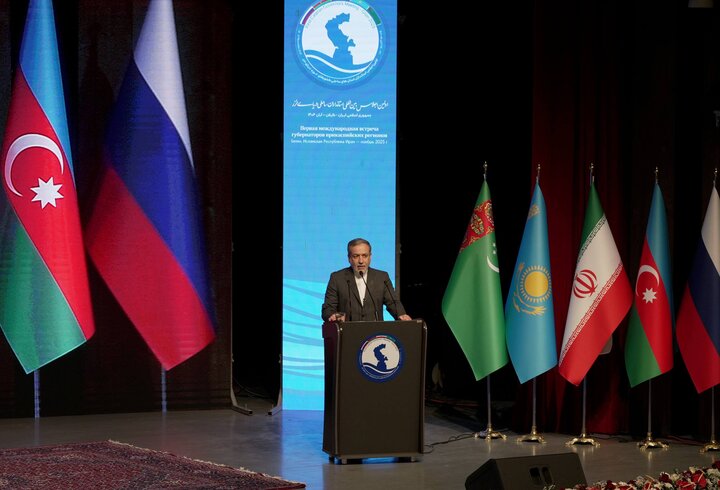Iran prioritizes Caspian Sea states for strategic cooperation

TEHRAN, Nov. 18 (MNA) – Iran considers its Caspian neighbors a top priority for cooperation and regional development, Foreign Minister Seyed Abbas Araghchi said, emphasizing the strategic importance of the Caspian Sea.
According to Mehr News Agency, Iranian Foreign Minister Abbas Araghchi made the remarks speaking on Tuesday at a summit in Rasht themed “Caspian: Bridge for Friendship and Regional Development,” that gathered Governors from 12 provinces across five Caspian Sea littoral countries.
In his remarks, the top Iranian diplomat stated that Caspian Sea littoral states are a priority for Iran in terms of cooperation and strengthening regional ties.
"Our neighbors are our priority, and this is the most fundamental principle in the foreign policy of the Islamic Republic of Iran. We have plans and are making efforts to expand relations with our neighbors and to take advantage of significant political, economic, social, cultural, and even security opportunities with them," he emphasized.
He highlighted that just as the Persian Gulf holds critical importance for Iran, the Caspian Sea is equally significant. "As you know, the Islamic Republic of Iran shares borders with 15 countries, by sea and land. Just as the Persian Gulf and its surrounding region are important to us, the Caspian Sea holds equal importance. We engage with very significant neighbors in this region and face many important issues."
Araghchi underlined that Iran’s relations with the Caspian littoral countties are strategic and highly goal-oriented, reflecting Tehran’s commitment to regional stability and collaborative development.
He went on to say that Iran’s relations with all the Caspian littoral states have been very good and strategic. "Iran-Russia relations are a strategic partnership, and a 20-year strategic cooperation agreement between the two presidents was signed last year. Dr. Pezeshkian has made very successful visits to Russia and Azerbaijan, and within the next month, he will also visit Turkmenistan and Kazakhstan."
Saying that the Caspian Sea region is very significant in areas such as energy and transport corridors, Araghchi highlighted that there are also strong potentials for collaboration in trade and tourism in this region.
He added that Iran's three coastal provinces, along with holy cities including Mashhad, are among the largest tourist destinations for the Iranian people, expressing hope that these regions will also become key destinations for regional tourism.
"The Caspian Sea is a treasure trove of various resources," he concluded.
The Caspian Governors’ Summit, themed “Caspian: Bridge for Friendship and Regional Development,” opened on Tuesday morning in Rasht, the capital of Iran's Gilan Province, with participation from 12 provinces across five regional countries.
The summit, initiated by the Islamic Republic of Iran, includes five governors from Iran and seven governors from Russia, Kazakhstan, Turkmenistan, and Azerbaijan. It features a general panel and three specialized panels covering economy and investment, transit and logistics, and environment and fisheries, all moderated by senior national and provincial officials.
During the summit, governors and official delegations aim to strengthen economic, environmental, cultural, and tourism cooperation, discussing joint projects, enhancing transit and the North-South corridor, activating port capacities, and establishing trade arrangements among provinces.
The event also provides a platform to boost Caspian tourism, coordinate regional policies, showcase agricultural, industrial, and investment capacities of coastal provinces, and facilitate joint trade exhibitions.
The Caspian Sea region is strategically important for trade, energy, and environmental resources. Cooperation among coastal provinces can enhance regional development, boost cross-border trade, protect the environment, and promote tourism. Summits like this provide an official platform for dialogue, showcase investment opportunities, and align regional policies to foster economic and cultural collaboration.





